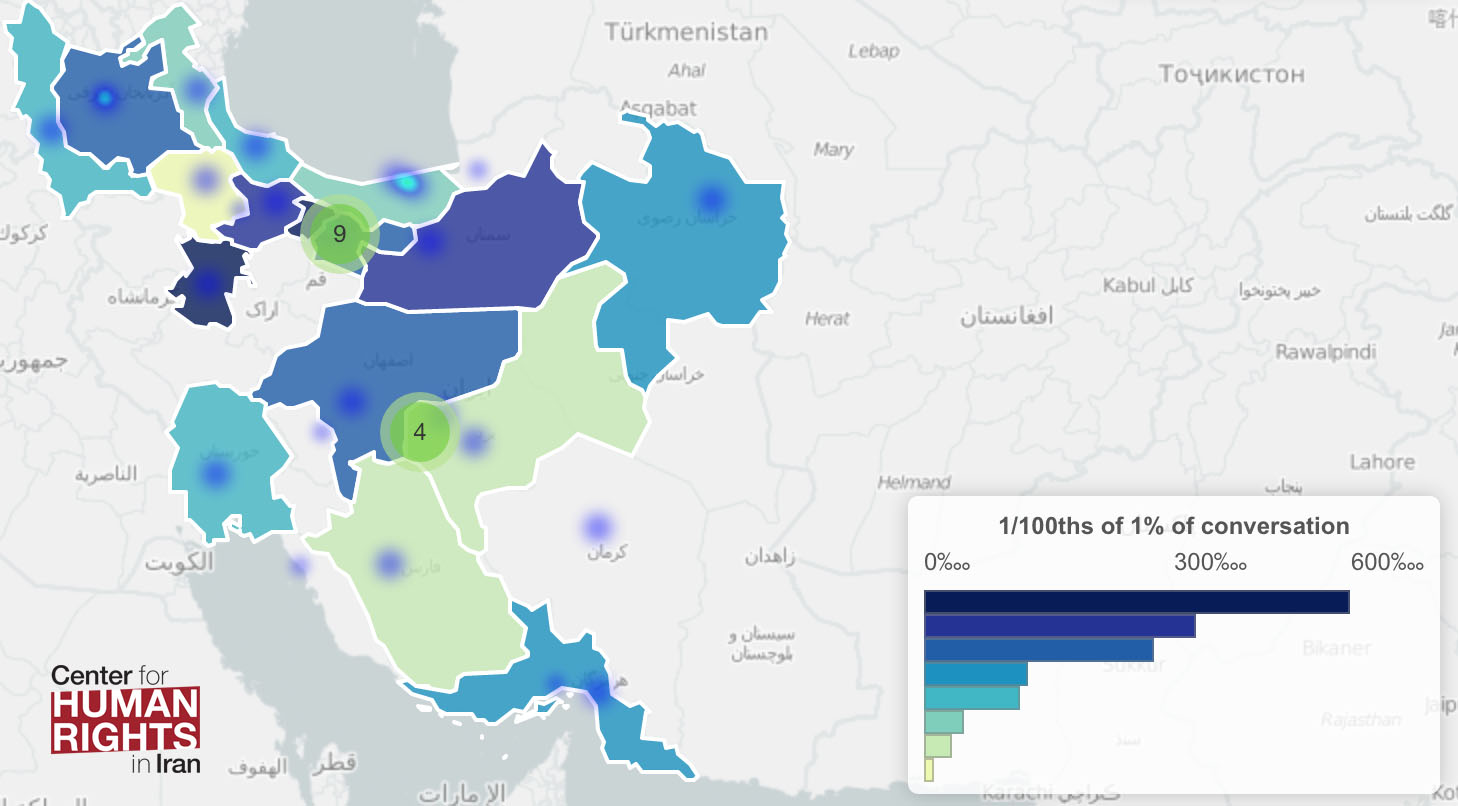Rouhani Supporters Launch Huge Twitter Storm Backing Him After Hardline Mob Forces Him to Flee Rally

Map shows extent of #ISupportRouhani tweets in Iran by region.
Tens of thousands of President Hassan Rouhani’s supporters took to social media to express their outrage after he was surrounded by an angry mob loyal to Supreme Leader Ali Khamenei and forced to flee a rally in Tehran on June 23.
In a short time, their #ISupportRouhani («#حامی_روحانى_ام») Twitter storm in Farsi exploded to the top of the network’s highest trending topics worldwide.
An investigation by the Center for Human Rights in Iran (CHRI) shows that the Twitter storm, which began at 10pm Tehran time on June 23 and peaked two hours later, generated more than 150,000 tweets in a matters of hours, with 70 percent originating from inside Iran where the network is officially banned.
Figures show most tweets were sent from the following provinces, in this order: Hamadan, Alborz, Semnan, Qazvin, East Azerbaijan, Isfahan, Tehran, Hormozgan, Khorasan Razavi, Khuzestan, Gilan, West Azerbaijan, Mazandaran, Yazd and Zanjan.
Watch how Iranians turned #حامی_روحانی_ام (I Support Rouhani) into the 1st worldwide trend today. Ironically twitter is blocked in Iran. pic.twitter.com/hUF99INBVa
— IranHumanRights.org (@ICHRI) June 23, 2017
During the annual Quds Day rally in the capital, an angry mob shouted slogans against Rouhani, comparing him to Iran’s first president, Abolhassan Banisadr, who was ousted in a power struggle in 1981 and fled to France.
The outpouring of support for Rouhani has taken place on social media where Iranians can express themselves relatively freely, in contrast to the highly censored state-controlled traditional media outlets that shy away from reporting that is critical of Iran’s supreme leader, Ali Khamenei, who has recently made remarks widely seen as highly critical of the Rouhani administration’s policies.
In addition to I-Support-Rouhani, other hashtags in Farsi, such as Rouhani-is-not-Alone and He-Was-the-Peoples-Choice, also generated large trends, often with emojis that symbolized love and victory.
Deputy Parliament Speaker and Rouhani ally Ali Motahari, who also became a target of the pro-Khamenei mob on June 23, called on the Judiciary to apprehend those involved.
“The group that shouted slogans against the president during the Quds Day rally in a premeditated attack committed obvious crimes. The evidence is there and now we have to see how the Judiciary will react,” he said in an Instagram post. “The Tehran Prosecutor is facing a great test either to pursue the criminals in a show of judicial impartiality or close its eyes and ignore justice in favor of political partisanship.”
The angry chanting mob that surrounded Rouhani at the rally on June 23 took place days after Khamenei made a reference to Banisadr’s downfall and warned the Rouhani government not to fall in the same “dangerous” path.
“The country should not be polarized,” Iran’s leader said in a speech to government officials on June 12, 2017. “People should not be divided into supporters and opponents, as they were in 1980 by the president at that time. It’s dangerous.”
On June 7, Khamenei said his supporters should “fire at will” against a government that does not do its job effectively, a remark that many Rouhani supporters saw as implicitly inviting such actions against the centrist president.





